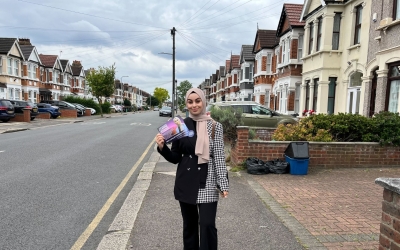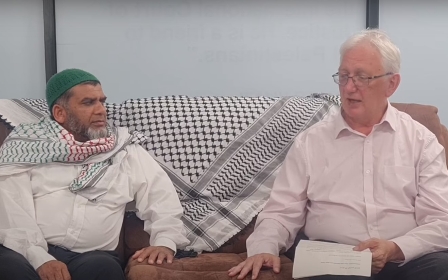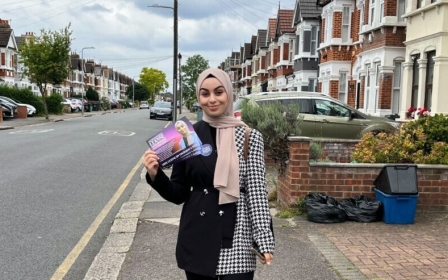UK elections 2024: How Gaza became the final straw for Labour's Corbyn wing

On polling day on 12 December 2019, activist and writer Sonali Bhattacharyya was out in the rain until the evening, knocking on doors to get people out to vote.
“I’d been there since morning. I remember coming back to the local Labour party office just as the exit poll was dropping. And we were all in tears,” she recalled.
“I put a lot of hours in… sort of seems quite unthinkable now, actually.”
Bhattacharyya joined Labour after its defeat in the 2015 general election, as the situation seemed “desperate”.
“I’ve never been a party political person, I never thought I'd be active in the Labour Party, never really had much truck with electoral politics, never really thought that it was worth putting time into,” she said.
New MEE newsletter: Jerusalem Dispatch
Sign up to get the latest insights and analysis on Israel-Palestine, alongside Turkey Unpacked and other MEE newsletters
But Bhattacharyya quickly worked out that the party was “impenetrable” for campaigners like her.
“It was very difficult to get involved in any way,” she told Middle East Eye.
That all changed with Jeremy Corbyn’s election as Labour leader in 2015 and the establishment of Momentum, a grassroots campaign set up to mobilise his supporters.
“For the first time, people actually contacted me… not from our CLP [Constituency Labour Party], but from the local Momentum group,” she said.
“I was like, OK, I can actually get involved.”
Bhattacharyya set to work building her local Momentum group in Waltham Forest, north-east London.
After the snap 2017 general election, when Labour saw the greatest increase in its vote share since 1945, she was elected BAME (Black, Asian and minority ethnic) officer at her local branch.
“There was a sense of optimism… I think we all thought that we were close to government.”
Funnelled into the party
Mona Bani, a community organiser, recalled turning up to canvass in a number of boroughs on 12 December, only to find them inundated with volunteers.
“People were streaming in… You’d turn up to one borough and be told we’re inundated… I remember jumping around the tube from borough to borough,” she said.
“I was quite struck by that, I think many of them were doing it in a personal capacity.”
In the weeks before 12 December, Bani had toured sixth-form colleges and universities in marginal seats as part of a London-based grassroots drive to register students to vote.
The network was a loose coalition of organisers from across different movements, who coordinated through WhatsApp groups and Facebook.
“I was in a load of WhatsApp groups… I remember feeling like [there were] hundreds and hundreds [of people in them],” she said.
“You’d end up in a WhatsApp group and be like, ‘Wow, I've worked with this person in a project five years ago,’ or ‘I saw these people at Palestine demonstrations, or I saw these people at anti-police brutality gatherings, and now they're here,” Bani recalled.
“All these swathes of people who ordinarily would have probably been involved in grassroots campaigns… were all funnelled into the Labour Party,” Bhattacharyya said.
Sam Swann also joined the party shortly after Corbyn was elected as Labour leader.
In the 2017 election, Swann was out campaigning in Acton North and Ealing, where Rupa Huq was re-elected as an MP with an increased vote share of 59.7%.
“At the time, it felt amazing. Looking back now, it's like, oh, of course, the party headquarters would f*** us over... we weren't put somewhere where getting the vote out could have really counted.”
According to Swann, the party headquarters, which was staffed by opponents of Corbyn, was not releasing accurate polling data to campaigners coordinating canvassing, which led to large concentrations of volunteers in safe seats.
“They will have known from the data they were getting back that [the seats] would have become safe.
“That's why I have absolutely zero love for the party… they have screwed us over in so many different ways, partly, I think, maliciously, partly through their horrifically low expectations.”
“12 December 2019 felt like my super villain origin story. Oh, nothing matters, but vengeance,” he joked.
MEE has not verified Swann's claim that the Labour Party headquarters was not releasing proper polling data to its activists on the ground. The party has been contacted for comment.
In 2020, a leaked cache of WhatsApp messages between senior Labour officials who worked at the party headquarters revealed their efforts to lose the 2017 election through the diversion of funding away from Corbyn-supporting candidates.
The Labour Files, An Al Jazeera investigation, based on hundreds of thousands of leaked internal documents, revealed how Corbyn-supporting activists and Palestine supporters in the party were targeted by unelected officials, facing intimidation, harassment and expulsion as part of a campaign to oust the leadership.
“We were aware that there was a lot of underhand tactics, but it was really shocking to read the extent of that in the Forde Report, and to see the extent of it in Labour Files… it's been a real wake-up call for a lot of us who didn't fully buy into the idea of electoral politics,” Bhattacharyya said.
Gaza broke the camel’s back
Following Labour’s defeat in 2019, and the election of Keir Starmer as its leader, the party haemorrhaged members.
Under Starmer's leadership, membership numbers are down by at least a third. Between January and March this year, they plummeted by 23,000 over the party’s stance on Gaza.
David Evans, the general secretary appointed by Starmer, scrapped the community organising unit set up under Corbyn and oversaw a surge in disciplinary cases against members and local branches.
Swann stayed in the party until October 2023, when he left due to the party’s stance on Gaza.
“Gaza was the last thing that broke the camel’s back,” he said.
“It just felt like there wasn't any way back. It's kind of amazing going from 2019 and going all in, even supporting right-wingers in the Labour party, just for the chance at a shortcut to a version of very mild social democracy to now [thinking] there's no hope through this vehicle,” he said.
The grassroots drive in 2017 and 2019 is markedly missing from the current Labour campaign.
'Very clearly action for Palestine is at the leading front now of mobilising progressive forces in Britain'
- James Schneider, Momentum co-founder
But it has not vanished. Rather, it is being channelled into other forms of organising, with many former campaigners joining the burgeoning Palestine solidarity movement or rallying around pro-Palestine independent candidates in the upcoming election.
“Very clearly action for Palestine is at the leading front now of mobilising progressive forces in Britain, as you can see from the scale of the mobilisations almost every week… and the diverse organising that was taking place against the Israeli war machine,” James Schneider, the communications director at Progressive International and co-founder of Momentum, told MEE.
Swann is now involved in Palestine solidarity campaigning in the arts, advocating for the Freedom Theatre in Jenin.
“I've never really seen this level of solidarity and conscious political education going on in our community before,” he said.
“If you are consistent with what you believed in 2017, then why would you not organise around this issue?”
Middle East Eye delivers independent and unrivalled coverage and analysis of the Middle East, North Africa and beyond. To learn more about republishing this content and the associated fees, please fill out this form. More about MEE can be found here.






